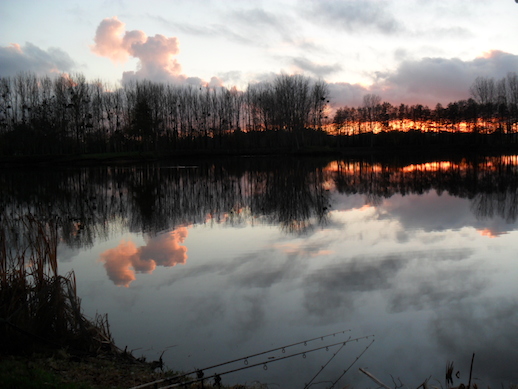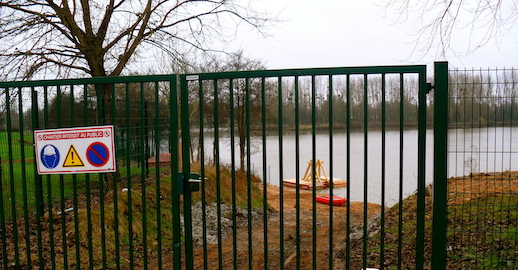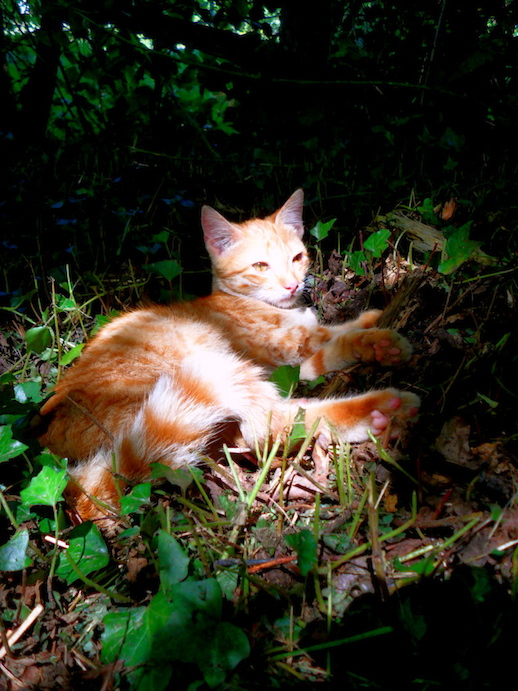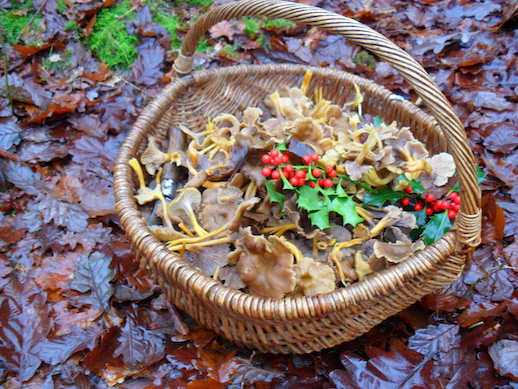Shadows and Reflections: the annual collection of postings where Caught by the River’s ever-reliable contributors and friends old and new take a look back on the events that have shaped the past twelve months. Today, and making his second appearance on the site this week, it’s the turn of the legend that is Dexter Petley:
This year has not been about me, or what I did, what I wrote, said, or if I even talked to anyone at all. I recall no conversation. No, it would be unwise of me to think anything I achieved is of more importance than the untimely erosion of those things we hold dear on Caught by the River. So as the French countryside turns into a playground for the nouveau riche, or the morally poor, I can only offer threnody for the victims.
La Ferrière
La Ferrière at Fontaine-Simon is an 18 acre gravel pit flooded in 1950. Its big old, dark carp gave me the run-around and have earned my respect over many seasons. Some of them were chronicled on CBTR in 2010 (see Letters from Arcadia). Semi-wild, the lake sits on the edge of a village with a butcher’s shop, a café, a post office, a medieval church and a garage. An ugly village struggling between two worlds; the scrapyard and pallet maker, bungalow Bill and his black Audi, his neighbours who live in a floodlit street which last year was a barley field. A village at odds with itself, but living within its means and limitations. A fishing village, in fact, with its four adjacent gravel pits. One where the banks are nought but pontoons and sheds for weekenders, one for the private gardens of stuccoed villas, one half-flooded and still working, and La Ferrière, the public face, run by the Federation with free fishing for the people on the national license.
Then, two years ago, La Ferrière became a pawn in an unsavoury scheme. The local mayor is one of those hook or by crook, self-inflated officials who regard anglers as freeloaders whose license money goes to the Federation, not raining into his coffers. All that water sitting there going to waste on a miserable bunch of fishermen and ducks. There is already an aqua-centre and a campsite at one end, but in 2011 the authorities closed the plage when water quality was found to be well below statutory requirements. Instead of tackling the neighbouring farmers whose abstractions dried the feeder streams and whose nitrates, herbicide and pesticide caused the algae bloom and toxic levels, this mayor decided the lake deserved urbanisation, dressing up, killing off. His first scheme to build 80 holiday chalets along the banks lacked funding and the desired dynamism. He wanted cool, traffic jams, overflowing car parks, tourists who squeal through the countryside in reckless pilgrimage to an adrenalin park, fort sensations for the 7-70s. So he courted the leisure consultants and they proposed the téléski nautique.
Among the kind of people who go in for ecologically destructive water sports, there was rejoicing. The téléski is probably the most offensive of water sports as it requires permanent structures, great metal pylons sunk into the lake bed, massive concrete blocks all round the banks, high tension steel cables, buildings, a powerhouse, equipment sheds, all the paraphernalia of the public spectacle. To sweep opposition from his path, the mayor’s lackeys issued the kind of notice which in France, in 1941, would have been signed: Der Militaebefehlshaber in Frankreich. This is to inform you that following the project « Téléski nautique » sur le plan d’eau de La Ferrière, la Communauté de Communes des Portes du Perche a dénoncé la convention activités pêche en date du 6 Janvier 2013.
Yes, they denounced fishing. Such despotic use of language only awakens suspicions which die hard in rural France. One mayor within the community of communes opposed the scheme, a brave man who went to a weak local press in awe of authority. His talk of secrecy, suppressed reports and propaganda was ignored. There had been a sanitation assessment, required by law, which concluded that the venue was unsuitable, the water polluted and a potential danger to participants. The ecological impact assessment is devastating too. But, put simply, private money changed hands. An unnamed backer put 400,000 euros on the table and the bulldozers rolled in like Panzers this November without any warning.
France is often lauded for its infrastructure, the speed and success of its developments – from new motorways to green belt housing. Things happen here, for good or bad, because there is no consultation. As long as the local mayor is on side, the land is seized, the owners sell, everyone capitulates. No one opposes, and the law is against all means of opposition anyway. The only opinion which counts is the one with the platitudes, the money, the one with the Mussolini vision, the rhetoric of progress.
The publicity is a venal propaganda as distorted as the lake itself will become. The proposed opening for March 2015 presents an Olympic charade of sensational thrills in a “beautiful natural environment in the heart of the countryside”. Pylons on concrete blocks? Bulldozers scraping out the bull rush beds? The mayor has vaunted téléski as essential to rural development and tourism, a sport which will “make the site dynamic” and bring 10,000 visitors per year to a village of 900 inhabitants. Knee boarding, wakeboards, skis on tram lines, about as dynamic for wildfowl and carp as you can get. I shall miss it sorely, ten minutes down the road, a place where I met the good old boys who stand capless under trees as it pours on their pike floats. Where the winter sunsets made you stand and stare and I wish I could forget them, now they’re up for trashing.
Fôret de Courcerault
One Sunday afternoon in autumn, Laure and I set out with our baskets for the forest of Courcerault with its pines and oaks and slopes of thick bracken, long views across valleys where church steeples mark villages hidden in the hills. We were, of course, after chanterelles, a mushroom as evolved and as essential as the carp of La Ferrière. When you find them, a place becomes that sacred patch, that yearly gathering you’re drawn to almost against your will. You dream it, and in the half light of a winter’s afternoon you’re on your hands and knees just to touch them, to forget the world, but to smell the world, far from the evils you never think will arrive here.
To remind you of the place, and the mood, Letters from Arcadia, November 2011, is once again witness to the magic of days. This particular Sunday we sensed nothing wrong, mounting the track through oaks which, we always thought, had red rings painted on them just for responsible clearance, one day, but not yet, rings so faded over the years they seemed turned to lichen. We skirted pines along the edge, through bracken as we hoped to find it. But this is lowland scrub, where chanterelles are always rare, and stopping here isn’t in the plan. We’d carried our picnic with us, so we climbed higher, looking for seating stumps or bench boughs, to eat our pasties and gaze across the shires. The trees thinned and we looked up from our inbred scrutiny of the floor. Looked up to expect the thickening squads of pine trunks, the oak frame holding them in, the darkening centre and brown slush of bracken where secret chambers full of chanterelles are like lost cities of the forest floor. But it just wasn’t there. The forest had gone.
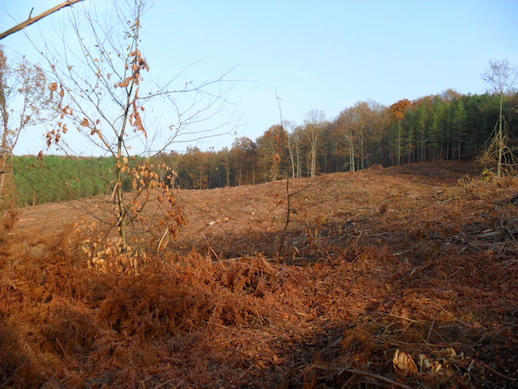
Instead of our bracken slopes, instead needle carpet, holly, oak, beech, firs and spruce, there was churned up clay, crushed branches, stumps, the light turning everything to gory battlefield. The heart torn out of the hillside. From outside you couldn’t tell. The chainsaw massacres had left a thin veil of trees on the outside, so passers-by wouldn’t notice the pillage. It was like a taxidermy forest, its skin, scales and coat on the outside, straw within, memory in formaldehyde.
We wandered dazed over the no man’s land. All around us, every standing tree we could find as far as we could walk had a red ring, a white ring, an axe-man’s noose; and they always had. We’d been mushrooming on death row all that time. You grow into a forest. A forest grows into your life. Returning year after year, you recognise every fallen bough, every dip and slope, every shape and smell. When sifting through a basket of picked mushrooms afterwards, we remember picking every single one, and where it was, and how it was. I can never get lost in a forest, even in the dark. The shape of the sky through the branches, the direction the owls come from at dusk, the navigating wind. The forest at Courcerault had always been a kind of advent calendar of chanterelles. Each week throughout the season, right up until the end of December, they’d shift and come up elsewhere. We knew it so well; every dip where under the bracken we’d find those bigger, grey fluted giants; or the edge of a deer trail which plunged into an escarpment, there among the thick needles and rotting branches we’d fill a basket with the smaller, yellow tubulars which glowed in the dusk before we headed home.
But without the trees, we were lost. It was impossible to recognise the slopes, edges, dips and hollows, even though they were still there. Without the trees, we were blind. And likewise, the chanterelles. There was no reason why they shouldn’t have hatched just this once more, as they were probably all set to do so. The forest floor hadn’t actually changed; apart from the violation, so maybe that’s a stupid observation, but I’ve known enough woodland where clearance and perturbation hasn’t stamped them out. While Laure tried to chip the condemned rings from the standing trees with her mushroom knife, instead of weeping and cursing with her I scoured the bald forest floor. Not one single mushroom had appeared. The forest was murdered, sterile, utterly finished. Reaped. Courcerault is still a tiny village of twenty houses, a church, a cemetery. On June 5th, 1944, a collaborator denounced the entire maquis of Courcerault to the Gestapo. On the 30th, all eleven were shot by a firing squad.
Le Chaton
In June, around midnight, during rain like lead shot on the yurt roof, thunder like dynamite rocking the rafters and lightening spitting fifty yards out front, I heard the tiny frantic mewing of a kitten. I opened the door and he jumped inside, so tiny you could have hung him from a rear view mirror, a live bundle of ginger bones, spring- green eyed, long tail striped and straight, huge copper paws and a will to live more electric than the storm. He knew he was saved, and wasted no time on pointless greeting. One circle of my legs was sufficient, then tail up like a dodgem car, one cry of hunger and he leapt straight into the frying pan full of chips, spitting on the gas ring. Back on the floor he licks hot oil off his paws and makes a rapid lap of the yurt, his nose working on the food smells. The cupboards were bare.
I’d been fishing earlier that evening, just beating the storm home, driving back watching lightening two counties wide over the horizon. Stocks were low and it was omelette and chips and a pint of rosé for me. Ginger bones hadn’t eaten for days. All I could find were two miniature tins of unknown provenance. Crème Marrons de l’Ardeche, a sweetened chestnut spread, and tomato paste with beef pellets. I spooned the lot onto a plate and in thirty seconds it was gone. To make relations easier, I gave him the working title of Tiddly. He needed no coaching. He spotted my bed, a sofa-cum mattress on the floor, jumped in the patch I’d warmed, licked himself clean and dry, curled up and fell asleep.
The thunderstorm moved on. I looked on Tiddly in utter wonder. How had he found me? What had he sensed, seen, smelled that brought him here? In all likelihood he’d been abandoned, taken for a car ride and thrown out of the window like a Coke bottle. The lane is only a forest lane an axle wide with moss growing down the centre. Either side is trackless forest. He must have walked through miles of trees. In a thunderstorm, what could he see? The outline of a yurt lit up by lightening? There’s nowhere else round here he could have gone but to me, across a two acre field of long grass, through broken trees and bramble thicket. An upright adult would have difficulty spotting the yurt in daylight, let alone a thunderstorm. This cat had eyes six inches off the ground, but the brain of a sputnik. I felt privileged, blessed even, like he was some visitation.
When it was time for me to sleep, I placed a cushion on the floor and scooped Tiddly onto the flat of my hand. He weighed about the same as an empty paper bag. He didn’t wake, as this was the sleep he’d dreamed of, the one which had kept him going. At dawn, and it came as no surprise, I was woken by the sound of bellows in a steam train. Too late of course, to prevent over-rich tinned paste launch itself in go-fast streaks of puree over my clothes, left unwisely on the floor. On an empty stomach, and all that upheaval of orphanage and storms, factory food wasn’t a stable match for a wild appetite. Even so, I grabbed Tiddly by the scruff, dumped him outside, put the earplugs in, some janitor’s sawdust on the crime, then slept till mid morning. I threw open the door to blue sky, but Tiddly had gone. I spent an hour calling, then left for the daily round, knowing he knew.
At five the following afternoon he was waiting, hesitant until I showed myself, hiding in the straw mulch of my potato bed. I wept with joy to see him, so confident he was I’d come back, so trusting I wouldn’t throw him out the car window like the last bloke. What followed was two rare and wonderful months in the presence of something I knew not what, but it was rare, beautiful, humbling. Tiddly wasn’t more than six weeks old. His paws, ears, bone frame and long tail suggested a big cat in the making. I already have a large cat, now in his ninth year. He has no shame in his portly ways, the grey striped waistcoat bursting at the seams, the vets who called him double-chat and refused to touch him till I put him on a diet. He was Mycroft to Tiddly’s Holmes, sleeping in the Diogenes Club till the moon is high in the sky. Within days, Tiddly had learnt all there was to know about men, women, cats and food. He put Double-Cat off his own food, off his life. Tiddly ate more than DC and saw through all of our primitive natures. It was clear he couldn’t stay, didn’t want to stay. He was beyond us, far superior in his thirst for life, play, adventures. He’d impressed me like no other cat ever will. I loved him impossibly, but his craving for knowledge and sustenance was more than me and DC could offer and he put us in danger.
A friend of mine had always wanted a cat. An ex-Royal Navy man, aircraft carriers, so I reckoned they were matched. John had simply never found the right cat. So he came with his new girlfriend to meet Tiddly and fur was stroked, hands were shaken. By the end of August, Tiddly had all he’d ever wanted. A carp lake in nine acres of forest, a luxury bungalow, a conservatory and all the riches of the cat food aisle. Reports of his upbringing were good, already legendry. He slept in angler’s bivvies and kept the bait- eating mice down. Tattooed monsters placed him on their bed chairs and fried him bacon at sunrise. He thrilled the children. The new girlfriend had moved in and he was part of everyone’s happiness. He was safe, surely. Two cars a day passed in the lane. He stuck to the grounds, hunted round the lake, slept in the sun filled conservatory by day. Life was so good. He was set to grow big, and old and bring much more joy. Till some hit-and-run drunken petrol head killed him in October, and left him like a Coke bottle in the ditch.
